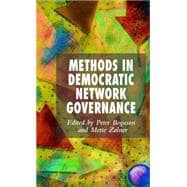
| List of Figures | p. viii |
| List of Tables | p. ix |
| List of Boxes | p. x |
| Foreword | p. xi |
| Notes on the Contributors | p. xii |
| List of Abbreviations | p. xiii |
| Methods for Network Governance Research: an Introduction | p. 1 |
| Why a book on methodology? | p. 1 |
| What is network governance? | p. 3 |
| Empirical research on network governance | p. 6 |
| Methodology | p. 9 |
| Structure of the book | p. 16 |
| Notes | p. 20 |
| A Comparative and Multi-level Analysis of Governance Networks: a Pilot Study of Employment Policy | p. 21 |
| Selection of scope, policy area, countries and sites | p. 23 |
| Research strategy: output-based backward mapping | p. 28 |
| Multiple methods | p. 32 |
| Managing collective research processes and data collection | p. 34 |
| Lessons learned from the pilot study | p. 38 |
| Empirical Findings: Seven Network Stories | p. 41 |
| The transnational governance network | p. 43 |
| The Danish national governance network | p. 47 |
| The English national governance network | p. 52 |
| The French national governance network | p. 55 |
| The local governance network in Koge | p. 59 |
| The local governance network in Birmingham | p. 63 |
| The local governance network in Grenoble | p. 67 |
| Summing up | p. 71 |
| Comparative Analysis Based on Expert Reports | p. 74 |
| Introduction | p. 74 |
| Comparative studies based on expert reports | p. 76 |
| A critical assessment of the use of expert reports | p. 79 |
| How should expert reports be analysed? | p. 84 |
| Assessing and analysing expert reports | p. 85 |
| Lessons learned | p. 97 |
| Document Analysis of Network Topography and Network Programmes | p. 99 |
| Introduction | p. 99 |
| Different ways of reading documents | p. 100 |
| Documents lost and found | p. 104 |
| Analysing network topography | p. 107 |
| Analysing network programmes | p. 116 |
| Conclusions | p. 122 |
| Qualitative Interviews: Studying Network Narratives | p. 125 |
| Introduction | p. 125 |
| Qualitative interviews in relation to the study of network governance | p. 127 |
| Selecting respondents | p. 132 |
| Conducting interviews | p. 136 |
| Analysing policy actors' narratives on labour market governance | p. 141 |
| Conclusion | p. 145 |
| Notes | p. 147 |
| Studying Local Network Exclusion through Observation and Diaries | p. 148 |
| Introduction | p. 148 |
| Observation studies and diary writing | p. 150 |
| Undertaking observation and diary studies in Koge, Birmingham and Grenoble | p. 156 |
| The data material and how it was analysed | p. 160 |
| Analysing observations and diaries: some tentative research results | p. 165 |
| Concluding remarks on the use of observation and diaries in network studies | p. 177 |
| Interactive Focus Group Interviewing in Studies of Network Governance | p. 179 |
| Introduction | p. 179 |
| Interactive focus group interviewing and network governance | p. 181 |
| Practical application | p. 187 |
| Analysing network governance through focus group interviews | p. 194 |
| Lessons from interactive focus group interviewing in studies of governance networks | p. 204 |
| Combining Qualitative and Quantitative Methods for the Analysis of Network Governance: Promises, Problems, Pay-offs and Potentials | p. 207 |
| The promises of method-mixing for the analysis of network governance | p. 207 |
| Experiences from the pilot study: the problems | p. 209 |
| Experiences from the pilot study: the pay-offs | p. 214 |
| Potentials: lessons learned and future directions | p. 221 |
| Notes | p. 223 |
| Conclusion | p. 224 |
| Questions and answers | p. 224 |
| Challenges in the research process | p. 227 |
| Final points | p. 229 |
| References | p. 233 |
| Index | p. 239 |
| Table of Contents provided by Ingram. All Rights Reserved. |
The New copy of this book will include any supplemental materials advertised. Please check the title of the book to determine if it should include any access cards, study guides, lab manuals, CDs, etc.
The Used, Rental and eBook copies of this book are not guaranteed to include any supplemental materials. Typically, only the book itself is included. This is true even if the title states it includes any access cards, study guides, lab manuals, CDs, etc.